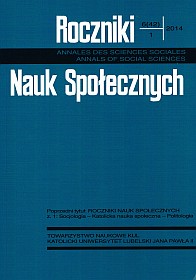Theoretical Aspects of Creating a Negative Political Image
Abstract
Modern election campaigns tend to be increasingly saturated with negative elements. Yet, the multi-dimensional nature of negative references in messages makes their real-life consequences very difficult to predict. Despite this fact, the acquisition and use – in various manners - of information in any way incriminating the political opponents is commonplace in modern election campaigns. In this context, the issues of activities that the negative campaign encompasses as well as boundaries in which the negative campaign fits in - the crossing of which may result in changing the outcomes assumed or planned by the sender of the messages – seem of particular interest. This article presents an analysis of the fundamental contexts of activities undertaken in the process of creating a negative image of a political entity or actor, and attempts to identify the boundaries of these areas. Among the most important analytical contexts, the author discusses the psychological, axiological, as well as normative and communication dimensions.
References
Ansolabehere S., Iyengar Sh.: Going Negative: How Political Advertisements Shrink & Polarize the Electorate, New York: The Free Press 1997.
Braithwaite V.: Harmony and Security Value Orientations in Political Evaluation, „Personality and Social Psychology Bulletin”, nr 23(4), 1997.
Caprrara G.V., Schwarz S., Capanna C., Vecchione M., Barbaranelli C.: Personality and Politics: Values, Traits and Political Choice, “Political Psychology” 27(2006).
Cwalina W., Falkowski A.: Marketing polityczny. Perspektywa psychologiczna, Gdańsk: Gdańskie Wydawnictwo Psychologiczne 2006.
Faber R.J., Times A.R, Schmidt K.G.: Accentuate the Negative?: The Impact of Negative Political Appeals on Voting Intent, [w:] Proceedings of American Academy of Advertising, red. P. Stout, Austin, TX: AAA 1990.
Feldman S.: Values, Ideology and the Structure of Political Attitudes, [w:] Oxford Handbook of Political Psychology, red. D.O. Sears, L. Huddy, R. Jervis, Oxford: Oxford University Press 2003.
Fenno R.: Home Style: Representative in Their Districts, Boston: Little and Brown 1978.
Geer J., Lau R.R.: Filling in the Blanks: A New Method for Estimating Campaign Effects, “British Journal of Political Science” 36(2)(2006).
Green D„ Gerber A.: Get Out the Vote! How to Increase Voter Turnout, Washington, DC: Brookings 2004.
Halman L.: Waarden in de Westerse wereld, Tilburg: Tilburg University Press 1991.
Hodges B.H.: The Effect of Valence in Relative Weighing in Impression Formation, ’’Journal of Personality and Social Psychology” 30(1974).
Jackson R.A., Carsey T.M.: U.S. Senate Campaigns, Negative Advertising, and Voter Mobilization in the 1998 Midterm Election, ’’Electoral Studies” 26(2007) No 1.
Kahn K.F., Kenney P.J.: Do Negative Campaigns Mobilize or Suppress Turnout? Clarifying the Relationship between Negativity and Participation, “American Political Science Review” 93(4X1999).
Kellermann K.: The Negativity Effect in Interaction: it's All in Your Point of View, “Human Communication Research” 16(1989).
Krupnikova Y., Easter B.T.: Negative Campaigns: Are the Good for American Democracy?, [w:] New Directions in Media and Politics, red. T.N. Ridout, New York: Routledge 2013.
Lang A.: Emotion, Formal Features and Memory for Televised Political Advertisements, [w:] Television and Political Aadvertising, vol. I, red. F. Biocca, Hillsdale, N.J.: Lawrence Erlbaum.
Lau R.R., Rovner B.I.: Negative Campaigning, “Annual Review of Political Science” 12(2009).
Lau R.R., Sigelman L., Rovner B. I.: The Effects of Negative Political Campaigns: a MetaAnalytic Reassessment, “Journal of Politics” 69(2007).
Lau R.R.: Two Explanations for Negativity Effects in Political Behavior, “American Journal of Political Science” 29(1985).
Marcus G.E.: Psychologia emocji i polityki, [w:] Psychologia polityczna, red. D.O. Sears, L. Buddy, R. Jervis, Kraków: Wydawnictwo Uniwersytetu Jagiellońskiego 2008.
Niven D.: A Field Experiment on the Effects of Negative Campaign Mail on Voter Turnout in a Municipal Election, “Political Research Quarterly” 59(2010), No 2.
Pilch I.: Wartości podstawowe a preferencje ideologiczne i decyzje wyborcze w wyborach do Sejmu 2011, „Preferencje Polityczne” 2012, nr 3.
Rokeach M.: Beliefs, Attitudes and Behaviour Change, London: Metheuen 1968.
Schwartz S.H.: Basic Human Values: Theory, Measurement and Applications, „Revue française de sociologie“ 47(2006).
Sosnowski T., Wrześniowski K.: Polska adaptacja inwentarza STAl do badania stanu i cechy lęku, „Przegląd Psychologiczny”, 1983, nr 26(2).
Teorie postaw, red. S. Nowak, Warszawa: Państwowe Wydawnictwo Naukowe 1973.
Tetlock P.E.: Coping with Trade- offs: Psychological Constraints and Political Implications, [w:] Political Reasoning and Choice, red. S. Lupia, M. McCubbins, S. Popkin, Berkeley: University of California Press 2000.
Turner J.S., Helms D.B.: Rozwój człowieka, Wydawnictwa Szkolne i Pedagogiczne, Warszawa 1999.
Turska-Kawa A.: Dyspozycyjny lęk jako zmienna różnicująca aktywność wyborczą w wyborach do Parlamentu Europejskiego w 2009 roku, [w:] Wybory do Parlamentu Europejskiego. Kampanie w Polsce i Europie, red. A. Sokala, B. Michalak, A. Frydrych, R. Zych Toruń: Wydawnictwo TNOiK 2010.
Turska-Kawa A..: Osobowościowe predykatory zachowań wyborczych. Rozważania w kontekście modelu „Wielkiej Piątki”, „Preferencje Polityczne” 2011, nr 2.
Turska-Kawa A.: Preferowany lad społeczno-polityczny w państwie a zachowania wyborcze w elekcji parlamentarnej 2011 roku, „Athenaeum. Polskie Studia Politologiczne” 35(2012).
Turska-Kawa A.: Psychologiczne uwarunkowania zachowań wyborczych, „Preferencje Polityczne” 2010, nr 1.
Turska-Kawa A., Wojtasik W.: Communication Function of Elections, “Communication Today”4(2013), nr 1.
Ustawa z dnia 5 stycznia 2011 - Kodeks wyborczy, Dz.U. nr 21, poz. 112.
Warren M.E.: Deliberative Democracy and Aauthority, “American Political Science Review” 90(1996).
Wojtasik W.: Functions of Elections in Democratic Systems, “Political Preferences” 2013, No 4.
Żukowski A.: Efektywność negatywnej kampanii wyborczej a dylematy etyczne, [w:] Etyka i polityka, red. E.M. Marciniak, T. Mołdawa, K.A. Wojtaszczyk, Warszawa: Wydawnictwo Uniwersytetu Warszawskiego 2001.
Copyright (c) 2014 Roczniki Nauk Społecznych

This work is licensed under a Creative Commons Attribution-NonCommercial-NoDerivatives 4.0 International License.


